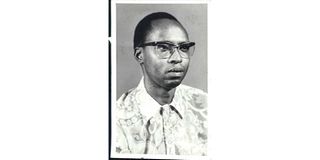Why John Ruganda is East Africa’s foremost playwright

Author and playwright John Ruganda.
When I thought that I was done with the Makerere Class of 1964, a literary associate probed me to tell our Saturday Nation readers what literary grit made John Ruganda produce such epic plays.
The mention of Ruganda charged my literary nerves as he is arguably one of the best playwrights in East Africa.
What really made Ruganda stand out as a thespian amongst his drama peers?
Prof Chris Wanjala, while paying tribute to the fallen artiste in 2007, said: “John Ruganda’s name was associated with the University Free Travelling Theatre Movement in East and Central Africa.”
He further added: “As a second-year undergraduate, he was the chief organiser of Makerere University Free Travelling Theatre. This post gave him a platform to train as a young playwright and actor. He was also editor-in-chief of the Makererian, a students’ newspaper.”
Prof David Cook later retained Ruganda as a tutorial fellow in drama and theatre at Makerere University upon completion of his undergraduate studies.
He was also the secretary of Kampala Writers Club, founder member of the Ngoma Players — a theatre group in Kampala in 1970 — and the chairman of the Uganda Authors and Linguists Association.
Due to the political upheavals in Uganda in the 1970s, Ruganda relocated to Nairobi where he worked as an editor at Oxford University Press (OUP) before weaning himself from OUP to the literature department at the University of Nairobi as a lecturer specialising in drama and theatre arts.
Several literary pundits have probed me to inquire from his contemporaries how he managed to produce hit plays: The Burdens (1972), Black Mamba (1973), Covenant with Death (1973), The Floods (1980), Shreds of Tenderness (1982) and Echoes of Silence (1986).
My first interview was with David Mulwa in 2017. Ruganda and Mulwa, in the company of other drama gurus, staged many plays at the Kenya National Theatre in the 1970s.
When I probed Mulwa about his fond memories with his literary contemporaries such as Ruganda and Francis Imbuga, he said: “John Ruganda was our junior elder who directed most of our plays. When Ruganda directed Imbuga’s play, Man of Kafira, we all jubilated.”
He continued, “Ruganda was brilliant to a fault particularly when it came to stage directing. I learnt more from him about theatre than most of the books I read.”
Large cast
I further asked him about the small cast that he preferred. “Ruganda loathed the irresponsibility of a large cast. I recall during the rehearsal of Man of Kafira, he unrecognisably sat at the back of Education II hall at the University of Nairobi where we were staging the play and fumed an emphatic no to our cast. We all felt ashamed as he was the play director.”
I later crossed over to Makerere University for another sit-down with one of his protégés, Dr Aloysius Kwitonda, now a senior lecturer at the literature department.
“Will you ever produce a playwright to rival John Ruganda?” I asked. He held his breath for a while and finally responded, “Producing creative works as Ruganda did is not easy. Ruganda largely blossomed courtesy of Makerere Free Travelling Theatre (1966) and Makonde Group (1971).”
I later made yet another literary voyage to Kampala for a candid conversation with Ruganda’s Makerere classmate, Prof Timothy Wangusa who also spoke well of him.
“John Ruganda, a former seminarian, loved writing and it was not a surprise to his classmates when he penned his first play, Black Mamba during our second year of undergraduate studies.”
Ruganda rightly belongs to a coterie of East African playwrights whose works are worth studying such as Francis Imbuga (Betrayal in the City), Robert Serumaga (A Play), Ebrahim Hussein (Kinjeketile), David Mulwa (Redemption) and Ngugi wa Thiong’o (Black Hermit).
Interestingly, John Ruganda and Francis Imbuga wrote their doctor of philosophy (PhD) dissertations on each other’s works to cement their long-term relationship on stage.
His thesis was titled, “Alienation and Leadership Figures in the Plays of Francis Imbuga.” The epic research findings were later published in a book: Telling the Truth Laughingly: The Politics of Francis Imbuga’s Drama (1992).
His humour and hard-hitting sarcasm about the absurd are unmatched and reflect the reality of the East African sociopolitical situation after independence.
In Shreds of Tenderness, Odie furiously tells Wak upon return from exile, “Well, you have mettle I can say that for you. So now you are trying to scale the glass walls, are you? Go on; go right ahead; perhaps one fall is not enough for you.”
His satirical writing is further illustrated in Black Mamba when Belewa (a house boy) tells Namuddu about Prof Coarx, “… I knew by swaying your shimmering behind in the Professor’s eyes, you would dig deep in his heart and pocket too.”
The million-dollar question: What is your rating of John Ruganda amongst West African drama gurus like Ama Ata Aidoo, John Clerk, Joe de Graft and Wole Soyinka? The debate rages on!
The writer contributes on literary matters in the Saturday Nation and recently authored a play, Rotten Apples. [email protected]




